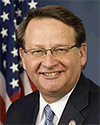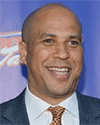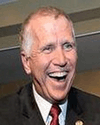While the 2014 election is more than half a year away, one fact stands out right now: There are 21 Democratic Senate seats up for election and only 15 Republican seats (including two special elections). Furthermore, In a way, 2014 will be even tougher for the Democrats than 2012 was, although ultimately they picked up two seats then. Their problem is that the Republicans up for reelection are almost all from deep red states, like Mississippi, Oklahoma, Texas, and Wyoming, which Democrats have almost no chance of winning. The only possibility of a Democrat winning a deep red state is a horrible, bloody Republican primary won by a tea party candidate who then proceeds to say something that alienates large numbers of women, as Todd Akin and Richard Mourdock did. In this context, Georgia and Kentucky come to mind. All the Democrats can do to aid this process is spend money in the Republican primaries to try to defeat the establishment favorite and nominate a fire-breathing tea party candidate.
In contrast, the Democrats have vulnerable incumbents in a number of red states, including Alaska, Arkansas, Louisiana, and South Dakota, and somewhat vulnerable candidates in other states like North Carolina, as well as an open seat in West Virginia. It is conceivable that Democrats could lose as many as six seats, and thus their control of the Senate. In addition to the many vulnerable candidates, in midterm elections, young Democrats and minorities tend not to vote, making the problem worse. Nevertheless, in politics, a week is a long time.
2014 will see a very strange situation: two states, Oklahoma and South Carolina, will hold elections for both senators. This is due to the early retirements of Sen. Tom Coburn (R-OK) and former senator Jim DeMint (R-SC). Luck would have it that in both states the other senator was also up for reelection in 2014. Unfortunately, the software that runs this site was never designed to handle two Senate races in the same state in one year, so we will not actively track these two special elections. But since it is a virtual certainty that the Republicans will hold both seats, we will just count them as Republican holdovers. Nevertheless, they are listed below for convenience although the only uncertainty is who wins the Republican primaries in each one.
The Democratic-held seats are listed first below, in alphabetical order by state, with the Republican ones following.
Click on a picture for the candidate's home page.Click on a name for the candidate's entry in the Wikipedia.
Click on a party (D) or (R) for the state party.
All off-site references open in a new window. Type CTRL-W in the window to close it. For on-site pages, use the browser's BACK button.
Democratic-held seats
Alaska 
| Incumbent | Challenger | Notes Polls |

Mark Begich (D) |

Dan Sullivan (R) |
In 2008, Mark Begich, then mayor of Anchorage, was personally recruited by then-DSCC chairman Sen. Chuck Schumer (D-NY), even though he had to face then-Sen. Ted Stevens, the longest sitting Republican in Senate history. Stevens was convicted of several felony violations a week before the election, but lost by fewer than 4000 votes. Stevens' convictions were later thrown out by Attorney General Eric Holder, but by then it was too late. Two establishment Republicans, Lt. Gov. Mead Treadwell (R-AK) and former attorney general and commissioner of natural Resources Dan Sullivan, ran in the primary. So did Joe Miller, a firebrand who won the 2012 Republican primary. Miller got Sarah Palin's vote but most of the other voters preferred former attorney general Dan Sullivan. It will be a tough and bitterly fought general election campaign. The amount of heat generated by this campaign, which could well determine control of the Senate, could melt the glaciers and contribute substantially to global warming. |
Arkansas 
| Incumbent | Challenger | Notes Polls |

Mark Pryor (D) |

Tom Cotton (R) |
This seat is something of a family tradition. For 18 years it was occupied by Mark Pryor's father, David Pryor, who retired in 1996. In 2002, David Pryor's son, Mark Pryor, ran for it and defeated incumbent senator Tim Hutchinson by 7 points and became so popular the Republicans didn't bother to field a candidate against him in 2008. He is not so lucky this time. His opponent will probably be Rep. Tom Cotton (R-AR), a young very conservative candidate with two degrees from Harvard but nevertheless tea party backing. It is probably a tossup at this point. Unlike many red-state Democrats who are running away from the Affordable Care Act ("Obamacare"), Pryor is running TV ads attacking the insurance industry for dumping sick people and saying that the ACA allows sick people to get medical care. If he wins, this will be a case study for years to come. |
Colorado 
| Incumbent | Challenger | Notes Polls |

Mark Udall (D) |

Cory Gardner (R) |
Democrat Mark Udall is up for reelection for the first time in this swing state. At first it looked like he might face Ken Buck, who was the losing candidate in the 2010 Colorado Senate race, but then Buck dropped out to run for the House and Rep. Cory Gardner jumped in. Despite the fact that Colorado is becoming a bluish state in presidential elections, Udall is in the fight of his life here against Gardner. Incumbents always have an advantage, but it appears to be close. Udall's first cousin, Tom Udall, is the senior senator from New Mexico. Unlike Mark, Tom is waltzing to a landslide victory in New Mexico, in part because 47% (yes, that number again) of the New Mexico population is Latino and Latinos strongly favor the Democrats. |
Delaware
| Incumbent | Challenger | Notes Polls |

Chris Coons (D) |

Kevin Wade (R) |
Chris Coons had the pleasure of running against Christine "I am not a witch" O'Donnell in a 2010 special election to fill the Senate seat vacated by Joe Biden when he became Vice President. He won't be so lucky this time, but Delaware is a very blue state and the Republicans have no bench at all there, so he can serve another five or six terms in the Senate if he wants to. His opponent this time is a wealthy businessman, Kevin Wade, with too much time on his hands. On the other hand, Delaware is a very small state, so it is easy to travel around it. |
Hawaii
| Incumbent | Challenger | Notes Polls |

Brian Schatz (D) |

Cam Cavasso (R) |
After the death of Sen. Daniel Inouye in Dec. 2012, Gov. Neil Abercrombie appointed Lt. Gov. Brian Schatz (D-HI) to the Senate. A special election will be held in Nov. 2014 to fill out the rest of Inouye's term. At 40, Schatz represents a new generation in Hawaii politics. This did not sit well with Rep. Colleen Hanabusa, who has long wanted to succeed Inouye, so there was a primary. After election day, Schatz led by 1635 votes, but a storm forced two precincts, with a total of 8000 voters, to close. A week later, the voters in those precincts got to vote and Schatz' lead held. He now goes into the general election as the overwhelming favorite against former state representative Cam Cavasso. |
Illinois
| Incumbent | Challenger | Notes Polls |

Dick Durbin (D) |

Jim Oberweis (R) |
Dick Durbin is majority whip, the second most powerful position in the Senate. He is also from a very blue state, Illinois. His fourth term is all but certain. The Republicans managed to find a challenger for Durbin this year, state senator Jim Oberweis, a rich businessman, but it is pointless exercise for him. The really interesting question about Illinois' representation in the Senate is whether Michelle Obama will challenge Sen. Mark Kirk (R-IL) in 2016. |
Iowa 
| Challenger | Challenger | Notes Polls |

Bruce Braley (D) |

Joni Ernst (R) |
Sen. Tom Harkin (D-IA) will be 75 years old 2 weeks after the 2014 election. He decided that he's been around long enough and will not run for reelection. Iowa is a swing state, and Harkin's departure set off a chain reaction in both parties as they started dealing with it. Rep. Bruce Braley (D-IA) is the Democratic nominee and probably the strongest one the Democrats have. After a five-way primary, the Republicans nominated Joni Ernst, who is a woman, but running a testosterone-heavy campaign, among other things, bragging how good she is at castrating hogs. She supports a "fetal personhood" amendment to the Iowa constitution and says she would have voted against the recent farm bill, something not likely to please Iowa farmers. Braley is going to depict her as far too right-wing for purple Iowa. Polls show him with a small lead initially. |
Louisiana 
| Incumbent | Challenger | Notes Polls |

Mary Landrieu (D) |

Bill Cassidy (R) |
Many black Democrats left Louisiana in the wake of Hurricane Katrina and never returned. Nevertheless, Landrieu managed to win in 2008 and has fought hard for the state. Working in her favor is that the Landrieu name is well known in Louisiana. Her father, Moon Landrieu, was mayor of New Orleans, a post now occupied by her brother Mitch Landrieu. Gov. Bobby Jindal (R-LA) might have been a formidable opponent, but decided to keep his powder dry until 2016 when he might run for President. Louisiana is a state to watch up to election day and probably beyond it due to the state's peculiar jungle primary system recently adopted by California as well (and Louisiana is rarely a trend setter with California playing catchup). On Nov. 4 there will be a multiway primary open to all voters. If nobody gets 50% (likely), then there will be a runoff between the top two on Dec. 6, which might determine control of the Senate. Three Republicans are running against Landrieu in the primary. Rep. Bill Cassidy (R-LA) is the establishment favorite and most likely to make the runoff. However, Air Force colonel Rob Maness is a tea party candidate in the race as well as a virtual unknown, state representative Paul Hollis. It will be a bloody campaign. |
Massachusetts
| Challenger | Challenger | Notes Polls |

Ed Markey (D) |

Brian Herr (R) |
When President Obama nominated Sen. John Kerry to be secretary of state, he forced a special election for Kerry's seat. It was won by then-representative Ed Markey, who will have to defend it in November. The only plausible candidate the Republicans have is former senator Scott Brown, and he is indeed running for the Senate--but in New Hampshire. Markey is safe. The best the Republicans could come up with was Brian Herr, a member of the Hopkinton board of selectmen. Usually ambitious selectmen run for the state senate, not the U.S. Senate. After he loses in November, maybe he can adjust his sights for 2016. |
Michigan
| Challenger | Challenger | Notes Polls |

Gary Peters (D) |

Terri Land (R) |
Sen. Carl Levin (D-MI) could have won reelection easily but he decided to retire. He would have been 80 on election day. There could have been a free-for-all here, but both parties managed to clear the field in advance of the August primary. The Democrats selected three-term congressman Gary Peters. The Republicans picked two-term former secretary of state Terri Land. The race could be close. Land was a controversial secretary of state, purging thousands of voters from the rolls while she was in office. She has run a lackluster campaign so far. In one TV ad, she spent 10 sec. drinking coffee on camera, which some media advisors say is one of the worst political ads ever. |
Minnesota
| Incumbent | Challenger | Notes Polls |

Al Franken (D) |

Mike McFadden (R) |
Al Franken beat then-senator Norm Coleman in 2008--a Democratic wave year--by just 312 votes after six months of legal wrangling following the election. As a former professional comedian, some people were worried he would spend his time in the Senate shooting off one liners at the Republicans. But he held his tongue, kept his head down, and played the role expected of a junior senator. His Senate colleague, Sen. Amy Klobuchar (D-MN), won a 34-point landslide in this blue state in 2012. While Franken is not likely to repeat that feat, unless the Republicans can pull a rabbit out of the hat, Franken is likely to win reelection. Their candidate is Mike McFadden, a multimillionaire whose entire career was at Lazard Ltd, a Wall St. investment firm. Franken is going to paint him as a mini-Mitt Romney, which could be fatal in a state that Romney lost by 8 points. |
Montana
| Incumbent | Challenger | Notes Polls |

Amanda Curtis (D) |

Steve Daines (R) |
Max Baucus is a moderate Democrat in a state that votes for Republicans in presidential elections but has a long history of voting for Democrats at the state level. He decided that six terms is enough and planned to retire in 2015. Obama then decided to send him to China as ambassador before his term ends, so Gov. Steve Bullock (D-MT) had the opportunity to name a replacement. He chose his own lieutenant governor, John Walsh, who previously had served 30 years in the Montana National Guard, retiring in 2012 as a brigadier general. On AUg. 7, Walsh dropped out of the race after it became known he had plagiarized his masters thesis. On the Republican side, Rep. Steve Daines (R-MT) won the primary, as expected. One complication is the presence of Roger Roots on the ballot as the Libertarian Party candidate. There are plenty of libertarians in Montana, and Roots could pull some votes from Daines. Still, Dainies is the favorite here. |
New Hampshire
| Incumbent | Challenger | Notes Polls |

Jeanne Shaheen (D) |

Scott Brown (R) |
New Hampshire is about as friendly to female politicians as you can get. Both senators, both representatives and the governor are all women. Shaheen is well known in the state, having served two terms as governor before being elected to the Senate in 2008. Shaheen's biggest challenge will come from former Massachusetts senator, Scott Brown, who is going to have to fight off the "carpetbagger" label. Also, Brown first has to win a primary against conservative activist Karen Testerman, former state senator Jim Rubens, and former U.S. senator Bob Smith. The New Hampshire primary is late--Sept. 9, so the primary season is sure to be long and bitter with the other Republicans aiming anti-RINO munitions at him for months. Nevertheless, he is likely to win the primary and lose the general election. |
New Jersey
| Incumbent | Challenger | Notes Polls |

Cory Booker (D) |

Jeff Bell (R) |
When Frank Lautenberg died in office, Gov. Chris Christie called a special election which Newark mayor Cory Booker won. Now Booker will have to start campaigning all over again. No serious Republican ran in the primary, which was won by Jeff Bell, a aide to Ronald Reagan and sometime candidate for public office. He has no chance at all against Booker. |
New Mexico
| Incumbent | Challenger | Notes Polls |

Tom Udall (D) |

Allen Weh (R) |
Tom Udall is a mere stripling at 64. He has won two elections as New Mexico attorney general, five as a congressman, and one as a senator. New Mexico has long since ceased to be a swing state and has become a deep blue state, so this seat is Udall's as long as he wants it. He comes from a very political family. His first cousin, Mark Udall is senator from Colorado, his uncle, Morris Udall, is a congressman from Arizona, and he is also related to Sen. Mike Lee (R-UT) and to former Oregon senator Gordon Smith. The Republicans nominated their former state chairman, Allen Weh. He will be crushed in the general election. |
North Carolina 
| Incumbent | Challenger | Notes Polls |

Kay Hagan (D) |

Thom Tillis (R) |
Kay Hagan beat then senator Elizabeth Dole in the Democratic wave year of 2008 by 8 points, but she was helped a lot by a disastrous ad run by Dole accusing Hagan of taking money from the Godless Americans PAC. The ad was so over the top, that it became a major campaign issue. She won't be so lucky this time, but of course she is now an incumbent in this swing state. There was a nasty Republican primary won by the establishment candidate, state house speaker Thom Tillis. The general election will be very hard fought, with outside groups pouring money into the state. The Republicans will try to tie Hagan to the unpopular Obama but the Democrats will counter by typing Tillis to the unpopular state house of representatives, of which he was speaker. With both major party candidates so unpopular, Libertarian Party candidate Sean Haugh might be a factor in the race, probably hurting Tillis more than Hagan. |
Oregon
| Incumbent | Challenger | Notes Polls |

Jeff Merkley (D) |

Monica Wehby (R) |
Jeff Merkley won a very narrow victory over then-senator Gordon Smith in 2008. In his first term as a senator, he has been a high-profile progressive and one of the leaders of the fight to abolish the filibuster. Oregon is a liberal state, and a young (56), progressive, with clear left-of-center positions on many issues, is certainly the favorite. His opponent is a pediatric neurosurgeon, Monica Wehby, who fought off a tea party candidate in the Republican primary. |
Rhode Island
| Incumbent | Challenger | Notes Polls |

Jack Reed (D) |

Mark Zaccaria (R) |
Jack Reed is a low-profile guy who avoids the media and concentrates on service to his constitutents. They apparently like that since they elected him to his third term in the Senate in 2008 with 73% of the vote over his Republican challenger, the same 57% margin he got in 2002. The Republicans nominated a guy who cut his teeth on the Barry Goldwater campaign of 1964 and is now full tea party. If they had nominated a Republican in the mold of Lincoln Chafee, they might have at least lost gracefully. Now it will be a Reed landslide. |
South Dakota
| Challenger | Challenger | Notes Polls |

Rick Weiland (D) |

Mike Rounds (R) |
Tim Johnson had prostate cancer in 2004 and a cerebral hemorrhage in 2006 while doing a live radio interview. Although he won reelection in 2008, he decided that the sympathy vote would be smaller this time and he bowed out. The Republicans nominated popular former governor Mike Rounds. The Democrats chose Rick Weiland, who was an aide to former senator Tom Daschle, head of the state AARP organization, and now runs a restaurant. A complicating factor in the race is the presence of a former three-term Republican U.S. senator, Larry Pressler, in the race. Pressler is widely known in the state and even though he is running as an independent, he will certainly draw votes from Rounds. Initial polling puts him in the low teens. Nevertheless, most likely he won't wound Rounds badly enough to make a difference in the end. |
Virginia
| Incumbent | Challenger | Notes Polls |

Mark Warner (D) |

Ed Gillespie (R) |
Multimillionaire Mark Warner, the former governor of Virginia, has announced that he intends to stay in the Senate. He has already raised $7 million for his 2014 race. His likely opponent is former Republican National Committee chairman Ed Gillespie, who has never run for public office before. Nevertheless, Gov. Terry McAuliffe (D-VA) was in exactly the same position when he decided to run for governor of Virginia in 2013, so Gillespie can't be written off so quickly. That said, defeating a popular incumbent senator who could easily throw in $10 million of his $200 million fortune if need be, will be a very steep climb. |
West Virginia
| Challenger | Challenger | Notes Polls |

Natalie Tennant (D) |

Shelley Moore-Capito (R) |
Jay Rockefeller, who will be 77 on election day 2014, decided to call it quits. The DSCC had some trouble finding a candidate even though all six of the statewide elected officers in West Virginia are Democrats. Finally they convinced Secretary of State Natalie Tennant to make the run. Rep. Shelley Moore-Capito, daughter of former West Virginia governor and former felon, Arch Moore, has announced that she is running for the Republican senatorial nomination. On the day she announced a bevy of conservatives immediately attacked her for being too liberal, even though she is by far the best known Republican in the state. Former state senator and tea party favorite Pat McGeehan immediately jumped in and later jumped out, so Moore-Capito coasted easily to the nomination. The only certainty here is that come January West Virginia will have its first female senator. Nevertheless Moore-Capito is definitely the favorite. |
Republican-held seats
Alabama
| Incumbent | Challenger | Notes Polls |

Jeff Sessions (R) |

No Candidate (D) |
Jefferson Beauregard Sessions III is about as Southern as they come and also about as conservative as they come. He voted for everything George W. Bush put in front of the Senate except TARP and opposed everything President Obama wanted passed. He got 63% of the vote in 2008, although that was against an unknown black woman who son was currently serving time in federal prison. If the Democrats can come up with a white man with a solid track record, they might be able to keep Sessions below 60%. Unfortunately for them, no Democrat filed, so Sessions will run unopposed in the general election. |
Georgia 
| Challenger | Challenger | Notes Polls |

David Perdue (R) |

Michelle Nunn (D) |
Although Saxby Chambliss is a conservative Republican, he is at least willing to talk to the Democrats from time to time. However, that is enough of a sin to make it all but certain he would have faced a primary in 2014--and lost. Rather than go down to a tea party challenge, he announced that he will not run for reelection. Reps Paul Broun (R-GA), Phil Gingrey (R-GA), and Jack Kingston (R-GA), quickly signed up to run in the Republican primary. Then former George Secretary of State Karen Handel (R) also joined the fray. Handel was the executive at the Susan G. Komen Foundation who caused an uproar when she withdrew funding from Planned Parenthood because some of their clinics provide abortions. It was a bitter primary and runoff, eventually won by David Perdue, a rich businessman and cousin of a former Georgia governor. The Democrats settled early on Michelle Nunn, the daughter of legendary former senator Sam Nunn. Georgia is a fairly red state but Romney got only 53% of the vote in 2012, so if the Democrats can depict Perdue as a mini-Romney, it could be a close race. |
Idaho
| Incumbent | Challenger | Notes Polls |

Jim Risch (R) |

Nels Mitchell (D) |
Jim Risch has had an interesting history, running for lieutenant governor at a time when he was actually governor (as a result of a gubernatorial vacancy when then-governor Dirk Kempthorne resigned the governorship to become George W. Bush's secretary of the interior). In 2008, he ran for the Senate and won. He is running for reelection in 2014 and will win in a landslide. His opponent is a lawyer, Nels Mitchell, who has no chance at all. Sometimes it is hard to understand why candidates who know they are going to get wiped out even try. |
Kansas 
| Incumbent | Challenger | Notes Polls |

Pat Roberts (R) |

Greg Orman (I) |
Pat Roberts has run for Congress six times: three times for the House in KS-01 and three times for the Senate. The worst he has even done is 60% of the vote, which he got in 2008, when he beat the Democratic candidate by 24%. 2014 may be different, however. On Sept. 3, the Democratic candidate, Chad Taylor, dropped out of the race leaving Roberts to battle independent wealthy businessman Greg Orman, a moderate. Roberts fought off a tea party candidate in a bitter primary. He spent the Spring telling everyone how conservative he was. Now he suddenly has to switch and tell everyone how moderate he is. What was about as close to 100% certainty as you get in politics has now become a real horse race. What makes this race most curious is that Orman refuses to say which party he will caucus with if he wins. |
Kentucky 
| Incumbent | Challenger | Notes Polls |

Mitch McConnell (R) |

Alison Lundergan-Grimes (D) |
As minority leader, in principle Mitch McConnell ought to have no trouble getting reelected. Even though he compromises very little with the Democrats, tea partiers consider that far too much so they supported businessman Matt Bevin against him in the Republican primary. Bevin lost and now McConnell faces Alison Lundergan Grimes, Kentucky's secretary of state, in the general election. While Kentucky generally casts its electoral votes for the Republican candidate, six of the seven statewide elected officers are Democrats, so Kentuckians do vote for Democrats. The campaign is attracting a huge amount of outside money as New York and California liberals would love nothing more than to defeat McConnell. The campaign will be as black as coal. In fact, coal will be a major issue, with Grimes breaking from Obama (and the New York and California liberals paying for her campaign) by saying that coal is the greatest fuel since some caveman thought of setting a dead tree on fire. Grimes may or may not actually believe that, but the the coal mining industry is a major employer in Kentucky so Grimes has gone on TV next to a coal miner, attacking McConnell from the right, basically accusing him of being pro-environment and anticoal. |
Maine
| Incumbent | Challenger | Notes Polls |

Susan Collins (R) |

Shenna Bellows (D) |
Susan Collins belongs to a vanishing breed that once roamed New England like the buffalo in South Dakota: a moderate Northeastern Republican. She is personally popular in the state, but moderates are always subject to tea party challenges, even when the tea party candidate knows that the challenge could cost the Republicans a Senate seat. Fortunately for her, she escaped any serious primary challenges. Although Maine is sufficiently blue that in principle a strong Democrat would have a chance, Collins personal popularity and down home personality will probably save her. The Democratic nominee is Shenna Bellows, former state director of the ACLU. To get some badly needed publicity, Bellows is going to walk 350 miles, from one end of Maine to the other, but it probably won't help. |
Mississippi
| Incumbent | Challenger | Notes Polls |

Thad Cochran (R) |

Travis Childers (D) |
Six-term incumbent Thad Cochran wants to be a seven-term incumbent in Jan. 2015. But first he had to beat back a tea party challenger 35 years his junior, state senator Chris McDaniel. Conservatives went all out for McDaniel because Mississippi is so red that no matter who the Republicans nominate, he is very likely to win the general election. Consequently, there is no downside to nominating a far-right candidate, whereas, say, in Georgia, nominating the wrong candidate could actually mean defeat in the general election. It was a bitter primary, which McDaniel won by a hair, but Cochran won the runoff, mostly by convincing large numbers of poor black Democrats to cross party lines and vote for him. Cochran is now the heavy favorite in the general election. |
Nebraska
| Challenger | Challenger | Notes Polls |

Ben Sasse (R) |

Dave Domina (D) |
Mike Johanns has served two terms as governor or Nebraska, 4 years as George W. Bush's secretary of agriculture, and now one term as a U.S. senator. He could easily have been reelected, but decided not to run. Two tea party candidates, former state treasurer Shane Osborn and former assistant secretary of health and human services under George W. Bush, Ben Sasse, were the leading candidates. Sasse won the primary and is now a shoo in for the general election against Dave Domina, a populist lawyer. While Nebraska has a populist streak, it is not big enough to give Domina much of a chance. |
Oklahoma
| Incumbent | Challenger | Notes Polls |

James Inhofe (R) |

Matt Silverstein (D) |
James Inhofe has been active in Oklahoma politics since 1967, when he was first elected to the state House of Representatives. He is extremely conservative, even voting against a 2005 bill that prohibits the U.S. government from torturing people in its custody. He also has a 0% rating from the Human Rights Campaign. But the people of Oklahoma seem to like him: he has gotten 57% of the vote in each of his most recent three Senate elections and is likely to get about the same percentage in 2014. His hapless Democratic opponent is Matt Silverstein, an investment planner, whose grandmother was a full-blood Choctaw native American. |
Oklahoma
| Challenger | Challenger | Special election |

James Lankford (R) |

Connie Johnson (D) |
Sen. Tom Coburn (R-OK) is retiring at the end of this session of Congress to battle cancer, generating a special election in Nov. Rep. James Lankford (R-OK) jumped into the race, as did former speaker of the Oklahoma house, T.W. Shannon. Both Lankford and Shannon can be considered tea party candidates. Shannon had the support of ted Cruz, Mike Lee, and Sarah Palin, but Lankford trounced him in the primary. On the Democratic side, in a three-way primary, no candidate reached 50%, so state senator Constance Johnson and former U.S. Senate candidate Jim Rogers battled it out for the essentially worthless Democratic nomination on Aug. 26. Johnson won, but she has no chance in the general election. |
South Carolina
| Incumbent | Challenger | Notes Polls |

Lindsey Graham (R) |

Brad Hutto (D) |
Lindsey Graham has occasionally said things or done things that arch conservatives do not like, so he was primaried, but he won anyway. Conservatives in the state tend to grumble about him a lot, but when push comes to shove, they will hold their noses and vote for him, so he is safe. His Democratic opponent is state senator Brad Hutto. |
South Carolina
| Incumbent | Challenger | Special election |

Tim Scott (R) |

Joyce Dickerson (D) |
After former senator Jim DeMint's surprise resignation from the Senate to run the Heritage Foundation (and possibly prepare for a 2016 presidential run), Gov. Nikki Haley appointed Rep. Tim Scott to fill out DeMint's seat until a special election in Nov. 2014. Scott is black. Perhaps it is a sign that South Carolina's long history of racism is nearing an end, but no white politician came forward with the idea of getting the Democratic nomination and then running a very racist campaign, basically saying "Forget Democrats and Republicans, just vote for the white guy." In fact, the Democrats could barely find anyone who wanted to run. Ultimately, two county councilpersons and an unknown lawyer ran. A poll by Clemson University in early June 2014 had 79% of the people saying they hadn't made up their minds yet (i.e., had not heard of any of the candidates). Joyce Dickerson, who like Scott is black, won the nomination, so the race factor cancels out. As a well-known incumbent, Scott will win the general election easily, but with a female governor (Nikki Haley) and two black candidates running for the Senate, South Carolina is clearly charging ahead. |
Tennessee
| Incumbent | Challenger | Notes Polls |

Lamar Alexander (R) |

Gordon Ball (D) |
By Tennessee standards, Lamar Alexander is something of a moderate. Nevertheless, in 2008, he carried 94 of Tennessee's 95 counties, losing only in majority-black Haywood County in Western Tennessee. He racked up 67% of the vote in the process. He faced a tea party challenger but easily defeated him in the primary. The Democrats had a contest primary won by attorney Gordon Ball. Alexander will win the general election easily. |
Texas
| Incumbent | Challenger | Notes Polls |

John Cornyn (R) |

David Alameel (D) |
As the Latino population of Texas continues to grow rapidly, some day it may become a purple state, but that day won't be in 2014. The GOP nominee will be the incumbent, Sen. John Cornyn (R-TX). The Democrat will be a wealthy self-funding dentist, David Alameel. In most other states, Alameel would be an attractive candidate. He is an immigrant from Lebanon who pumped gas and worked his way through college and dental school, eventually ending up with a chain of dental offices and a lot of money. He is the American dream come true, but in Texas, the (D) after his name will doom him. But at least he won't embarass the party. |
Wyoming
| Incumbent | Challenger | Notes Polls |

Michael Enzi (R) |

Charlie Hardy (D) |
Wyoming is one of the most Republican states in the country. Michael Enzi could probably be reelected even if he was caught in bed with both a live boy and a dead girl. He was briefly challenged by Liz Cheney, daughter of former Vice President Dick Cheney, but she didn't have much of a chance and quickly withdrew. The Democrats nominated a retired Catholic priest who served as a missionary in South America. While there actually are (four) Democrats in the state senate (out of 30 members), none of them thought it worth bothering to run in an election they were doomed to lose. As a man of the cloth, Hardy has faith; the others have pollsters. Enzi got over 75% of the vote last time around and there is every reason to think he will get that again. |
